Private label cosmetics have become a booming industry in recent years, offering entrepreneurs and businesses the opportunity to enter the beauty market and establish their own brand without the need for extensive product development or manufacturing expertise. As a wholesale supplier of private label brands, Yunx Cosmetics understands the significance of profit margins in this competitive market.
In this article, we will explore how private labeling can significantly increase profitability for wholesalers. We will delve into the reasons why private label cosmetics are a lucrative choice, the benefits they offer to both manufacturers and retailers, and the strategies that can be implemented to maximize profit margins.
, private labeling has witnessed remarkable growth in the cosmetics industry. The report states that the market is expected to reach a value of USD 167billion by 2026. This surge in demand can be attributed to several factors, including the growing preference for unique and customizable products, consumer demand for quality at affordable prices, and the rise of e-commerce platforms.

The increasing popularity of private label cosmetics can also be attributed to the shifting power dynamics between manufacturers and retailers. A study conducted by Dartmouth College’s Tuck School of Business revealed that private label products have become a crucial component in the manufacturer-retailer relationship. Retailers are increasingly relying on private label brands to differentiate themselves from competitors and boost their profit margins. This trend has led to stronger partnerships between manufacturers and retailers, resulting in increased profitability for both parties.
The Benefits of Private Label Cosmetics for Wholesalers
For wholesalers, private label cosmetics offer various advantages that can significantly impact profit margins. Let’sexplore a few of them:
1. Customization and Branding Opportunities: Private labeling allows wholesalers to create their own unique brand identity and product line. From packaging design to product formulations, wholesalers have the freedom to customize every aspect of their cosmetics. This level of customization not only enhances brand recognition but also enables wholesalers to cater to specific customer preferences and market segments.
2. Higher Profit Margins: Private label cosmetics often have higher profit margins compared to reselling existing brands. According to a survey conducted by successful private label brands yield profit margins between 10% and 15% higher than national brands. Wholesalers can capitalize on this higher profitability by offering their private label products at competitive prices.
3. Greater Control Over Supply Chain: By creating their own private label cosmetics, wholesalers gain control over the entire supply chain, from sourcing raw materials to manufacturing and distribution. This control allows for streamlined operations, reduced costs, and increased efficiency.
4. Improved Customer Loyalty: Private label brands foster customer loyalty as they are exclusive to the wholesaler. By offering unique products, wholesalers can build a dedicated customer base that keeps coming back for their brand. This loyal customer following translates to repeat business and higher profitability.
Private label cosmetics provide wholesalers with a range of benefits that facilitate increased profit margins. By taking advantage of customization opportunities, higher profit margins, supply chain control, and improved customer loyalty, wholesalers can position themselves for success in the competitive beauty industry.
In the next section, we will delve into some strategies that wholesalers can implement to further boost their profitability. Stay tuned!
Market analysis comes before developing private labels
1. Market Research and Product Differentiation: Conducting thorough market research is essential before launching a private label cosmetic line. Identifying gaps in the market, understanding customer preferences, and assessing competitor offerings can help wholesalers develop unique products that stand out from the crowd. By focusing on product differentiation, wholesalers can attract a niche customer base and command premium prices, thereby increasing profit margins.
2. High-Quality Formulations and Ingredients: Maintaining high standards of quality is crucial for private label cosmetics. Wholesalers should invest in top-notch formulations and use high-quality ingredients to ensure customer satisfaction. By delivering products that meet or exceed customer expectations, wholesalers can enhance brand reputation, gain customer trust, and justify higher price points.
3. Effective Packaging and Branding: Investing in attractive and durable packaging can significantly impact the perceived value of private label cosmetics. Wholesalers should aim for packaging designs that align with their brand image, create a positive customer experience, and differentiate their products from competitors. Strong branding, including a visually appealing logo and consistent messaging, can also contribute to brand recognition and customer loyalty.
4. Strategic Pricing: Pricing is a critical element that can directly affect profit margins. While private label cosmetics often offer higher profit margins, it’s crucial to strike the right balance between profitability and market competitiveness. Wholesalers should conduct thorough pricing analyses, considering factors such as production costs, target market preferences, and competitor pricing. By setting prices that attract customers while ensuring profitability, wholesalers can maximize their profit margins.
In addition to these strategies, wholesalers can also leverage digital marketing and e-commerce platforms to expand their reach and boost sales. For instance, utilizing social media platforms like Instagram and Facebook can help wholesalers build brand awareness, engage with customers, and drive traffic to their online store. Online marketplaces and direct-to-consumer websites can also be valuable channels for wholesalers to sell their private label cosmetics directly to consumers, bypassing intermediaries and increasing profit margins.
Private label cosmetics offer wholesalers an incredible opportunity to increase profitability in the highly competitive beauty industry. By implementing strategic market research, focusing on high-quality formulations and packaging, setting optimal pricing, and leveraging digital marketing, wholesalers can maximize their profit margins and establish a strong presence in the market.
In conclusion, private label cosmetics drive wholesale profitability by providing customization opportunities, higher profit margins, supply chain control, and improved customer loyalty. By capitalizing on these benefits and implementing effective strategies, wholesalers can thrive in the dynamic beauty market. Stay ahead of the competition and embrace the power of private label cosmetics to fuel your success!
PrevPREVIOUSThe Rise of Independent Brands in the Beauty Industry
RELATED POSTS
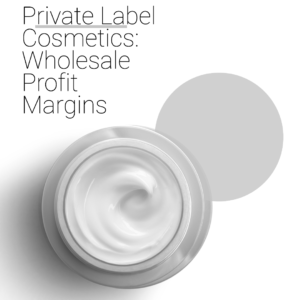 13 December 2023
13 December 2023Private label cosmetics have become a booming industry in recent years, offering entrepreneurs and businesses the opportunity to enter the beauty market and establish their own brand without the need for extensive product development or manufacturing expertise. As a wholesale supplier of private label brands, Yunx Cosmetics understands the significance of profit margins in this competitive market. In this article, we will explore how private labeling can significantly increase profitability for wholesalers. We will delve into the reasons why private label cosmetics are a lucrative choice, the benefits they offer to both manufacturers and retailers, and the strategies that can be implemented to maximize profit margins. The Explosion of Private Label Cosmetics , private labeling has witnessed remarkable growth in the cosmetics industry. The report states that the market is expected to reach a value of USD 167billion by 2026. This surge in demand can be attributed to several factors, including the growing preference for unique and customizable products, consumer demand for quality at affordable prices, and the rise of e-commerce platforms. The increasing popularity of private label cosmetics can also be attributed to the shifting power dynamics between manufacturers and retailers. A study conducted by Dartmouth College’s Tuck School
Read More »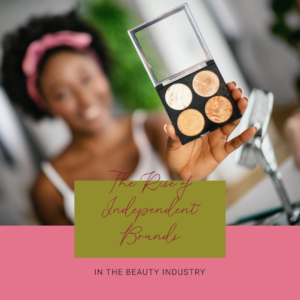 6 December 2023
6 December 2023The Rise of Independent Brands in the Beauty Industry In the ever-evolving world of beauty, a new and exciting trend has emerged – the rise of independent brands. These small, often niche brands are shaking up the industry and gaining a significant edge over established players. With their creativity, innovative products, and unique marketing strategies, independent brands are captivating the hearts of beauty enthusiasts worldwide. What are Independent Brands? Independent brands, also known as indie brands, are cosmetic and personal care companies that operate outside of the traditional beauty conglomerates. They are often founded by passionate individuals or small teams who carve their own path in the industry. These brands have gained popularity due to their focus on quality, authenticity, and originality. The Appeal of Independent Brands 1. Creative Freedom and Innovation Independent brands are not bound by the restrictions that come with being part of a large corporation. This freedom allows them to push boundaries, experiment with formulas, and create unique and innovative products. Whether it’s a revolutionary skincare ingredient or a bold makeup shade, indie brands are at the forefront of beauty innovation. According to a report by NielsenIQ[^1], indie beauty brands are 35% more likely to
Read More »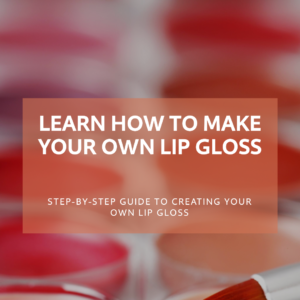 28 November 2023
28 November 2023Lip gloss is one of the must-haves in everyone’s makeup bag. It brings color and shine to lips, adding character and glamor. If you’re not satisfied with the lip gloss products on the market, or want to try homemade lip gloss, you’ve come to the right place! In this article, we will share the detailed steps on how to make lip gloss, so that you can customize a unique lip gloss product according to your preferences and creativity. Prepare Before you start making lip gloss, you need to prepare the following materials: 1. Base oil: You can choose coconut oil, almond oil, olive oil or grape seed oil as the base oil. These oils are hydrating and moisturizing, making lips soft and preventing dryness. 2. Essential oils: You can choose to add essential oils to add fragrance to your lip gloss according to your personal preference. Lemon, peppermint or rose essential oil are all good choices. 3. Honey or beeswax: These ingredients can add a certain viscosity to the lip gloss, making it easier to apply. 4. Color pigments: You can choose natural food-grade color pigments to add color to your lip gloss. For example: red, pink, orange, etc. 5.
Read More »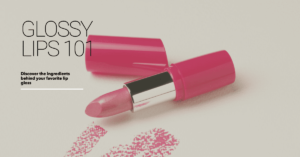 27 November 2023
27 November 2023Introduction: Lip gloss has been a staple in the makeup industry for decades, adding a touch of shimmer and shine to our lips. But have you ever wondered what exactly lip gloss is made out of? Join us on a fascinating journey as we delve into the enigmatic world of lip gloss and explore its captivating ingredients. Emollients: One of the key components that make up lip gloss is emollients. These ingredients are crucial for providing hydration and moisture to the lips, ensuring they feel soft and smooth. Some of the common emollients found in lip gloss formulations include: Jojoba oil: Known for its similarity to the skin’s natural oils, jojoba oil is a popular emollient in lip gloss. It helps to soften and moisturize the lips, leaving them feeling nourished and supple. Coconut oil: This versatile oil is not only a kitchen staple but also a beloved ingredient in lip gloss. Coconut oil is known for its moisturizing properties, making it an excellent choice for keeping the lips hydrated and preventing dryness. Castor oil: Derived from the seeds of the castor plant, castor oil acts as a humectant in lip gloss. It attracts moisture and helps to lock it
Read More » 24 November 2023
24 November 2023Introduction Selling cosmetics in the U.S. market means adhering to strict labeling regulations. These are mandated by the U.S. Food and Drug Administration (FDA) under the Federal Food, Drug, and Cosmetic Act (FD&C Act) and the Fair Packaging and Labeling Act (FP&L Act). Correct labeling is not just a legal requirement but key to ensuring consumer trust and product success. Basic Requirements of FDA Cosmetic Labeling The FDA requires that cosmetic labels clearly display the product name, name and address of the manufacturer or distributor, net quantity of contents, and ingredient listing, among others. This information helps consumers make informed purchasing decisions and ensures transparency and safety of the products. Detailing Label Design Requirements The font size, color, and placement on the label must ensure visibility and readability. The FDA mandates that all necessary information must be easily noticeable by consumers and readable under normal conditions of use. Special Cases and Exemptions For decorative containers or small-sized products, the FDA provides specific labeling guidelines. There are exemptions in certain cases, though these are not common. It’s important to understand these special cases and ensure compliance even with non-traditional packaging. Avoiding Misleading Labels Creating accurate and non-misleading labels is crucial. Any
Read More » 24 November 2023
24 November 2023Introduction: In an era where personalization is increasingly becoming a consumer trend, custom cosmetic services offer a unique way for brands to center around customer needs, creating beauty products that truly meet their expectations. Our services extend beyond packaging design to include product formulation, brand strategy, and more, aiming to provide a comprehensive beauty solution. Main Content: 1. Customized Formulation Services: Meeting Specific Needs: We offer customized formulations for different skin types and beauty needs, ensuring each product precisely meets customer requirements. Innovation and Safety: Our R&D team focuses on innovation while ensuring all products meet the highest safety standards. 2. Personalized Packaging Design: Extension of Brand Image: Our packaging design team is committed to creating packaging that aligns with your brand image, enhancing brand recognition. Eco-friendly Options: We provide a variety of eco-friendly material options, helping your brand achieve sustainable development. 3. Brand and Market Strategy: Professional Consultation: We offer brand positioning and market strategy consultation to better position your products in the target market. Marketing Support: We provide design and strategy suggestions for marketing materials, aiding your product’s success in the market. 4. Rapid Sample Production and Flexible Delivery: Quick Sample Production: We can provide samples within 3-7
Read More »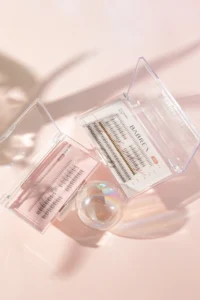 24 November 2023
24 November 2023White label makeup manufacturers are pivotal in the beauty industry, offering businesses an efficient way to launch their own branded cosmetics without the complexities of manufacturing. These manufacturers produce generic cosmetic products that clients can brand and market under their own names. In-Depth Benefits of White Label Makeup Manufacturers Cost-Effective Business Model: White label manufacturing significantly reduces the need for heavy initial investment in research, development, and production facilities. This model is particularly advantageous for small businesses and startups. Rapid Market Entry: With products that are already developed, tested, and ready for distribution, brands can quickly launch their makeup line, significantly reducing the time and effort required to bring a product to market. Wide Product Selection: These manufacturers typically offer a diverse range of products, from foundations and lipsticks to eyeshadows and skincare items. Brands can select and customize these products to suit their market niche and brand ethos. Quality and Compliance: Reputable manufacturers adhere to strict quality control standards and ensure compliance with relevant health and safety regulations. This provides brands with the assurance that their products are safe and of high quality. Branding and Marketing Focus: By outsourcing production, brands can concentrate their efforts on branding, marketing, and
Read More » 24 November 2023
24 November 2023Introduction In recent years, the global beauty and cosmetics industry has experienced significant growth. In 2023, the valuation of the beauty and personal care market reached $571.1 billion, with a projected compound annual growth rate of 3.8% from 2023 to 2027. This presents a tremendous opportunity for entrepreneurs aspiring to enter this field. Market Trends and Opportunities Market Size: In 2022, the global cosmetics industry was valued at $262.2 billion, with an expected compound annual growth rate of 4.2% from 2023 to 2030. Growth Drivers: The market growth is propelled by increasing demand for beauty and skincare products and a plethora of product innovations in formulations and packaging. Competitive Landscape: The market expansion has attracted a mix of new and established brands, leading to intense competition. Advantages of private label cosmetics Private label cosmetics are beauty products that are formulated and manufactured by a manufacturer, but marketed and sold by different retailers under their own brands. The advantages of this model include: 1. Product customization: You can customize product formulas and packaging according to the needs of your target market. 2. Cost-effectiveness: Cooperating with private label companies can significantly reduce R&D and production costs. 3. Packaging control: You can design
Read More »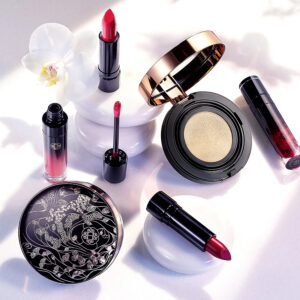 15 November 2023
15 November 2023Embark on an exhilarating journey into the beauty industry with your own cosmetic brand. This is the perfect time to bring your unique vision to life, tapping into the dynamic world of beauty and skincare. Market Research: Conduct in-depth market analysis to identify current trends, gaps, and opportunities. Use tools like Google Trends and social media analytics to understand consumer behavior. Engage with potential customers through surveys, social media polls, and community forums to gather insights. Brand positioning: Develop a unique brand story that sets you apart. Consider your brand’s mission, vision, and the unique selling proposition. Create a brand identity kit, including a logo, color palette, and typography that reflects your brand’s personality. Product development: Research and select white label cosmetics manufacturers with a good track record and align with your brand values. Request samples and conduct product testing to ensure quality and customer appeal. Work closely with manufacturers to customize formulations and packaging that resonate with your brand. Compliance and quality control: Familiarize yourself with FDA regulations and global cosmetic standards. Develop a checklist for quality control measures, including ingredient sourcing, product stability tests, and packaging safety. Brand Building and Marketing: Build a compelling website and e-commerce platform
Read More » 15 November 2023
15 November 2023In the vibrant world of cosmetics, lip gloss stands out for its ability to add a touch of glamour with a simple swipe. But what exactly is lip gloss made out of? Understanding its composition not only enlightens consumers but also aids businesses like Yunxcosmetics in crafting superior products. The Core Ingredients of Lip Gloss The journey to creating the perfect lip gloss begins with its base ingredients. Typically, lip glosses are a blend of oils and waxes. Lip oils, forming the core of many glosses, provide the smooth, silky application, while waxes give the gloss its structure and longevity. Commonly used oils include lanolin, jojoba, and almond oil, known for their hydrating properties. Enhancing with Additives Beyond the basics, lip glosses are often enriched with vitamins, such as Vitamin E, and other nourishing elements like aloe vera. These additives not only improve the health of the lips but also contribute to the gloss’s overall appeal and effectiveness. The Role of Lip Gloss Manufacturers Lip gloss manufacturers, especially those specializing in OEM cosmetics like Yunxcosmetics, play a pivotal role in the evolution of lip gloss. These beauty manufacturers are constantly innovating, experimenting with different formulations to meet diverse market needs. From


 12/20/2023 10:28 am
12/20/2023 10:28 am








